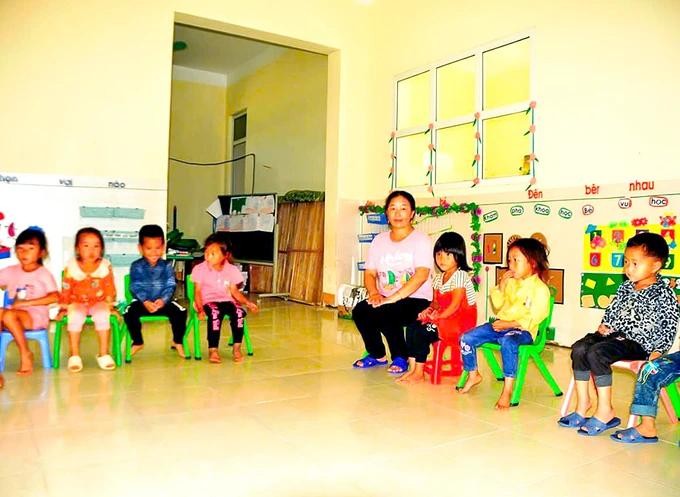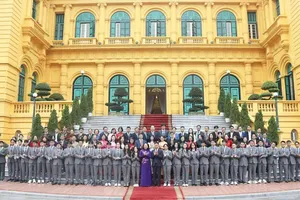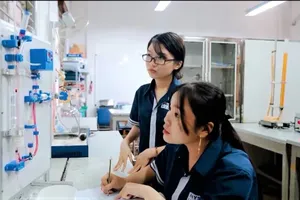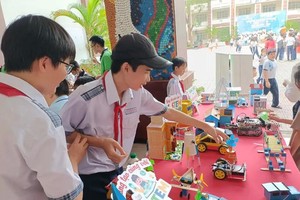
They are educators with decades of experience who traverse mountains and cross streams to reach Huoi Moi, the most challenging highland village in the Tri Le border commune of Nghe An Province’s Que Phong District to provide education. Their joy is simple that is the full attendance of students.
Huoi Moi has long been recognized as an exceptionally difficult village within the Tri Le border commune, inhabited entirely by the Mong ethnic group. Each day, teachers based in the commune must navigate over 10 kilometers of winding, steep dirt roads, flanked by cliffs on one side and deep ravines on the other, to arrive at the school.
At an elevation of approximately 1,500 meters above sea level, Huoi Moi is perpetually shrouded in fog and white clouds. Due to its remote location and challenging access, Huoi Moi Village is home to only the Tri Le 2 Boarding Primary School and Tri Le Kindergarten.
Educators of Tri Le 2 Boarding Primary School are engaged in teaching. For many years, both teachers and students have been utilizing temporary wooden classrooms or have been split between two separate sites, Huoi Moi 1 and Huoi Moi 2.
Huoi Moi School in remote areas of Nghe An border is the most deprived and difficult in the commune, so for the past 40 years, only male teachers have taken turns staying in the village to provide education for local children.
Fifty six year old teacher Luong Van Xuyen who is the longest-serving educator at Huoi Moi School recalled his inaugural class vividly, where he began by calling the names of the students on the roll. Out of the 25 students listed, only 17 were present in the classroom at that time.
In a classroom where one-third of the students were absent, teacher Xuyen expressed her concerns saying that teaching in a remote village, one of the most challenging areas in the commune and district, presents significant obstacles, particularly the language barrier, as the entire community is Mong.
Due to the harsh living conditions, many families do not prioritize their children's education. Consequently, maintaining a stable student population in each class is a considerable challenge. Tough circumstances led to many children in Huoi Moi dropping out of school. Despite these hardships, the teachers here have made remarkable efforts, traversing forests and crossing streams to visit each home and encourage children to attend classes.
Teacher Lu Van Son, who has dedicated many years to the highlands of Huoi Moi, noted that the Mong ethnic community has a tradition of being insular, primarily engaging with family and close relatives while seldom interacting with outsiders. This cultural characteristic makes it challenging to convince parents to allow their children to attend school. To effectively communicate with the local population, teachers must establish trust and rapport.
Consequently, when attempting to encourage students to enroll, teachers often accompany the village chief and the head of the parents' association. Teacher Son emphasized the significance of language instruction, as many students lack proficiency in the common language. Therefore, educators must prioritize language teaching before progressing to vocabulary and comprehension.
At Huoi Moi Kindergarten, three dedicated female teachers reside on-site, providing educational services to 60 children across two combined classes for 3-5-year-olds. These teachers consistently exhibit a strong work ethic, exceeding the performance expectations observed among their male colleagues at the primary level.
Teacher Lau Y Pay, born in 1986, has dedicated nearly 15 years to teaching at Huoi Moi Kindergarten, immersing herself in the life of the village. Despite living just 10 kilometers from the school, she and her fellow teachers often have to stay overnight due to the treacherous road conditions. This challenge is especially pronounced during the rainy season, when landslides pose a constant threat.
Since beginning her career in education immediately after graduating, 48 year old teacher Lo Thi Sau from Que Phong District has devoted herself to teaching career in Tri Le. She vividly recalled the challenging early years of bringing knowledge to this remote border area. At the time, there were no accessible roads. If teachers opted for a motorbike taxi, it would cost VND300,000—leaving them with just VND100,000 of their salary. To save money, she and her colleagues often walked all day to reach their school.
Most of the teachers at Huoi Moi are married, finding camaraderie in their shared experiences and drawing strength from their dedication to teaching, which serves as their primary source of joy and encouragement. Interestingly, all three teachers at Huoi Moi Kindergarten are married to teachers from Tri Le. This shared profession fosters deep understanding and support from their life partners, enabling them to stay committed to living in the village and dedicating themselves to the teaching profession in the challenging environment of Huoi Moi.
After 15 years of residing in the village, teacher Lau Y Pay has navigated the difficulties often faced by young educators and possesses the qualifications necessary to transition to a central school. Nevertheless, she has opted to remain in Huoi Moi, a remote Mong village that has become a cherished and familiar place for her, serving as a second home to which she wishes to remain connected.
Ms. Sau finds her greatest happiness as her three children consistently exhibit good behavior and excel in their studies. In Huoi Moi village, despite facing numerous challenges and shortages, the teachers continue to support one another in their efforts to fulfill their mission of imparting knowledge in the highlands. Teaching profession in this region remains challenging; however, the educators at Pha Ca Tun peak persistently dedicate themselves to their schools and classrooms, committed to fostering the growth of young minds in the mountainous area.
























